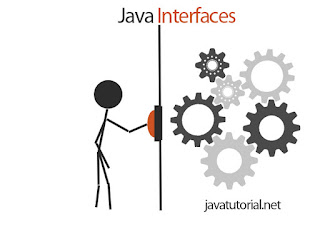b) Implementing interface
Aim:To write a JAVA program to implement Interface.
Description:
Program:
(i) First form of interface implementation
interface A
{
void display();
}
class B implements A
{
public void display()
{
System.out.println("B's method");
}
}
class C extends B
{
public void callme()
{
System.out.println("C's method");
}
}
class interfacedemo
{
public static void main(String args[])
{
C c1=new C();
c1.display();
c1.callme();
}
}
Output:
interface A
{
void display();
}
class B implements A
{
public void display()
{
System.out.println("B's method");
}
}
class C extends B
{
public void callme()
{
System.out.println("C's method");
}
}
class interfacedemo
{
public static void main(String args[])
{
C c1=new C();
c1.display();
c1.callme();
}
}
Output:
(ii) Second form of interface implementation
interface D
{
void display();
}
interface E extends D
{
void show();
}
class A
{
void callme()
{
System.out.println("This is in callme method");
}
}
class B extends A implements E
{
public void display()
{
System.out.println("This is in display method");
}
public void show()
{
System.out.println("This is in show method");
}
}
class C extends B
{
void call()
{
System.out.println("This is in call method");
}
}
class interfacedemo1
{
public static void main(String args[])
{
C c1=new C();
c1.display();
c1.show();
c1.callme();
c1.call();
}
}
Output:
interface A
{
void display();
}
class B implements A
{
public void display()
{
System.out.println("This is in B's method");
}
}
class C implements A
{
public void display()
{
System.out.println("This is C's method");
}
}
class interfacedemo2
{
public static void main(String args[])
{
B b1=new B();
C c1=new C();
b1.display();
c1.display();
}
}
Output:
interface A
{
void display();
}
interface B
{
void callme();
}
interface C extends A,B
{
void call();
}
class D implements C
{
public void display()
{
System.out.println("interface A");
}
public void callme()
{
System.out.println("interface B");
}
public void call()
{
System.out.println("interface C");
}
}
class interfacedemo3
{
public static void main(String args[])
{
D d1=new D();
d1.display();
d1.callme();
d1.call();
}
}
Output:
interface D
{
void display();
}
interface E extends D
{
void show();
}
class A
{
void callme()
{
System.out.println("This is in callme method");
}
}
class B extends A implements E
{
public void display()
{
System.out.println("This is in display method");
}
public void show()
{
System.out.println("This is in show method");
}
}
class C extends B
{
void call()
{
System.out.println("This is in call method");
}
}
class interfacedemo1
{
public static void main(String args[])
{
C c1=new C();
c1.display();
c1.show();
c1.callme();
c1.call();
}
}
Output:
(iii) Third form of interface implementation
{
void display();
}
class B implements A
{
public void display()
{
System.out.println("This is in B's method");
}
}
class C implements A
{
public void display()
{
System.out.println("This is C's method");
}
}
class interfacedemo2
{
public static void main(String args[])
{
B b1=new B();
C c1=new C();
b1.display();
c1.display();
}
}
Output:
(iv) Fourth form of interface implementation
interface A
{
void display();
}
interface B
{
void callme();
}
interface C extends A,B
{
void call();
}
class D implements C
{
public void display()
{
System.out.println("interface A");
}
public void callme()
{
System.out.println("interface B");
}
public void call()
{
System.out.println("interface C");
}
}
class interfacedemo3
{
public static void main(String args[])
{
D d1=new D();
d1.display();
d1.callme();
d1.call();
}
}
Output:





No comments